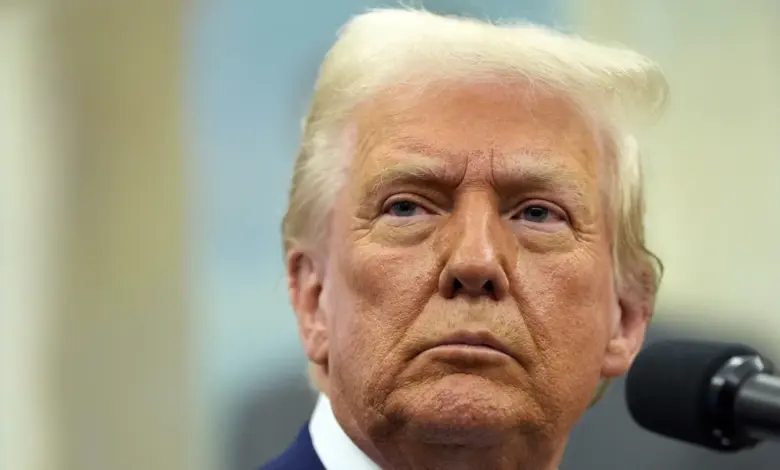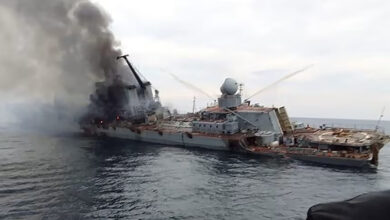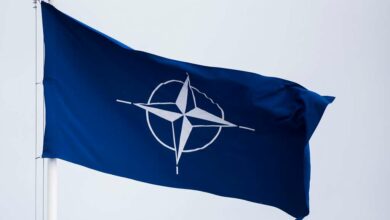
A dangerous fault line is opening as Donald Trump rushes to end the war in Ukraine.
The US president craves an early political triumph to fuel his claims to a Nobel Peace Prize. But an equitable end to the conflict may defy a quick fix since it poses existential issues for Ukraine and European security.
This tension was exacerbated by the president’s decision to exclude officials from Kyiv and European powers from US-Russia talks taking place in Saudi Arabia on Tuesday.
The fate of his push to end the war will ultimately rest on whether his swift pace can accommodate critical details of a peace that allows Ukraine to survive, secures the borders and security of Europe and avoids rewarding Russia’s illegal invasion.
Trump has shown little obvious concern for any of these three goals – one reason why his strategy is a gamble.
But each party in the process has grave concerns and significant leverage, which explains why ending the war will be far harder than his failed campaign trail promises to forge peace in 24 hours.
Trump wants a deal – perhaps any deal
The war often seems a distraction from what Trump really wants – the chance to sit down with Putin, one of the global strongmen he admires.
Still, there’s a chance that Trump’s urgency and power, plus that channel with the Russian leader, could change the dynamics of this World War I-style war of attrition.
Trump is, for instance, only voicing a reality that many US and European officials have shared privately for months: that Ukraine can no longer win the war and eject Russia from all the territory it has seized.
Trump’s subordinates endlessly laud him as the world’s greatest dealmaker. But his efforts so far seem naive.
He’s conceded some of Russia’s top goals, often seems to empathize with the goals of the invasion and has turned on America’s European friends who’ve shared the cost of supporting Ukraine’s war effort. Those are the same allies who Secretary of Defense Pete Hegseth says must police any peace alone.
In his most extraordinary move, Trump tried to claim half of Ukraine’s rare earth metals wealth — in a play that exploited an invaded nation’s desperate vulnerability. President Volodymyr Zelensky rejected the “deal.”
Trump appears to have little understanding of the historical hazards either in Ukraine or indeed in the Middle East, given his plan to move the Palestinians from Gaza so he can build beach resorts.
Trump’s view of every geopolitical crisis as a real estate deal waiting to be clinched suggests he might embrace an agreement that lets Putin keep all of the land he’s stolen just to stop the killing.
And there’s a big risk he’s being played by Putin. The Russian leader warmed the atmosphere ahead of the Saudi talks by handing Trump victories with the release of several US prisoners, including on Monday with Kalob Byers, 28, who was arrested on drug smuggling charges last week.
And Trump thinks he came away from his call with the Russian leader last week with a pledge to talk sweeping nuclear arms cuts. This is one reason why the Saudi talks involving Secretary of State Marco Rubio and national security adviser Mike Waltz are so important: They must test Russia’s seriousness and protect Trump from overzealous interpretations of Russian concessions.
The stakes are huge. A hurried peace deal that strengthens Russia and weakens European security by validating Putin’s expansionism would likely sow the seeds for an even worse future war.
At the end of the Cold War, President George H.W. Bush managed the fall of the Soviet Union and its satellite states in Eastern Europe — sometimes overruling regional leaders in the wider interests of the West and their own security. There’s no sign that Trump feels any such affinity for Europe or its future.
Can Ukraine save itself?
While Trump craves political glory, Zelensky is fighting for something far more profound: his country’s survival, now and as a future viable, independent sovereign state. Trump’s decision to open talks with Russia in Saudi Arabia on Tuesday without Ukraine raised fears he’s targeting a quick agreement with Putin that he’d then impose on Kyiv.
Zelensky warned last week at the Munich Security Conference that he would “never accept deals made behind our backs without our involvement.” But if Trump walks away, Zelensky would have to decide whether to fight on without US arms and ammunition and to rely on Europe’s lesser punch.
Zelensky understands that he can’t count on US support with Trump in the White House and said last week it was time to form a European army because, “the old days are over when America supported Europe just because it always had.”
Trump has given few signs that he’s got Ukraine’s interests at heart. Last week, for instance, he echoed one of Putin’s rationales for the war, saying that Ukraine’s NATO aspirations helped trigger Russia’s invasion.
This new US empathy with the invader, rather than the invaded party, is why Europe’s participation in peace talks is necessary to even the playing field. But Trump is already looking beyond Zelensky, who was the recipient of the telephone call that led to Trump’s first impeachment in his first term. He said last week that Ukraine needs elections “at some point” after a peace deal and archly noted that Zelensky’s poll numbers were “not great.” This is another Russian talking point that Trump has picked up — even though the idea that Putin, who sustains his long rule with sham elections, has any credibility in talking about elections is absurd.
Russia is relishing the sudden opening
Trump said on Sunday that he’s convinced after his phone call with Putin that the Russian leader wants to end the war. “I think he wants to stop fighting. I see that. We spoke long and hard,” the US president said.
But strategically, Putin may have reasons to keep fighting. Despite horrendous losses, his forces are making grinding progress on the blood-soaked battlefield.
The Russian president has already achieved some of his goals before sitting down with Trump. The US president has shattered Putin’s status as a pariah in the West by speaking enthusiastically about the possibility of summits in both the US and Russia. And by ruling out a path to NATO membership for Ukraine and the deployment of any US troops to keep an eventual peace, the Trump administration has given up key potential sources of leverage.
Putin might have failed in his bid to capture all of Ukraine, to take Kyiv and to replace Zelensky with a pro-Moscow leader. But he’s carved off a big chunk of territory in the southeast that he can use to protect Crimea and that offers a long shoreline along the strategically vital Black Sea coast.
Russia must now calculate whether its potential payoff for handing Trump a huge win with a peace deal will outweigh the benefits of continuing to fight. The lifting of US and European sanctions, for example, would free the Russian economy, and Trump is already demanding that Putin be readmitted to the Group of Eight industrialized nations.
Most scenarios for ending the war envisage a hard border between eastern and western Ukraine — reminiscent of communist East Germany and West Germany that emerged from World War II.
History suggests that Putin would use such territory to replenish his military for a possible future resumption of hostilities or to destabilize the rest of Ukraine with the hope of eventually getting a sympathetic government in Kyiv.
He’s long assessed he could wait out the West on Ukraine. His bet now seems likely to pay off as he seeks to to reconstitute the historic Russian empire and Moscow’s regional sphere of influence.
Putin is playing a far longer game than America’s lame duck president who’s desperate for a quick deal.
Europe scrambles to find a role in its own backyard
Until a few weeks ago, some European diplomats and foreign policy opinion formers were suggesting that alarm over Trump’s reelection was overblown, and that the new president’s volatility could be handled.
So, the hostility of Hegseth and Vice President JD Vance in Europe last week was a rude awakening. As was Trump’s shattering of Western unity over Ukraine by sending his team to discuss peace with Putin’s team before consulting Europe.
In retrospect, it’s baffling why European governments were so surprised. Trump is only doing what he said he’d do on the campaign trail. Their misreading of the US president led to the embarrassing spectacle of key leaders rushing to Paris for emergency talks on Monday to work out how to respond to being cut out of the game.
The outcome of the Ukrainian war is almost as vital for Europe as it is for Ukraine. A peace deal that strengthens Russia would leave the continent facing an emboldened enemy just as the US threatens to walk away from 80 years of security guarantees to its allies.
Europe’s severely depleted armed forces after years of budget cuts makes it doubtful it can sustain a meaningful peace force in Ukraine after any peace agreement.
And new promises of surged defense spending could take years to fill the gaps and will be a heavy political lift that will require cuts in social spending.
But British Prime Minister Keir Starmer warned after the Paris talks on Monday that Europe faced a “once in a generation moment.” In another sign that Europeans are trying to get their act together, Ursula von der Leyen, the president of the European Commission, wrote on X that Ukraine deserves “peace through strength,” echoing Trump’s new buzzword for his “America First” foreign policy.
Starmer offered to send UK troops to help monitor any peace deal in Ukraine as part of an international force, but with one important caveat — that there’s a US “backstop” since such a guarantee would be the only way to prevent Russia from invading Ukraine again.
His comment showed that European leaders understand that they’d be exposing their troops without US support and could risk getting into a war with Russia themselves.
Starmer, who plans to meet Trump in Washington next week, is offering himself as a bridge between European powers and the US president, while trying to repair Britain’s global clout that has waned since it left the European Union.
There are just two problems: Trump doesn’t seem interested in a bridge. And there’s little sign he really cares what the Europeans think.




